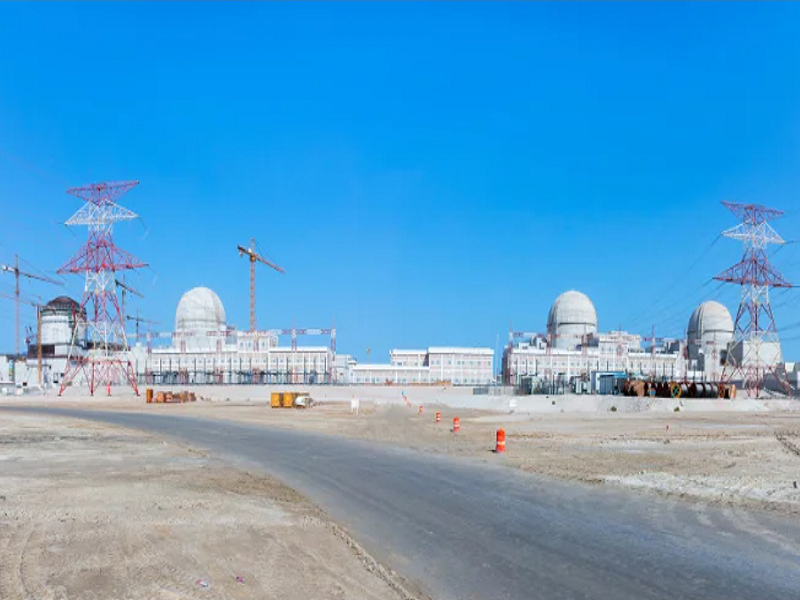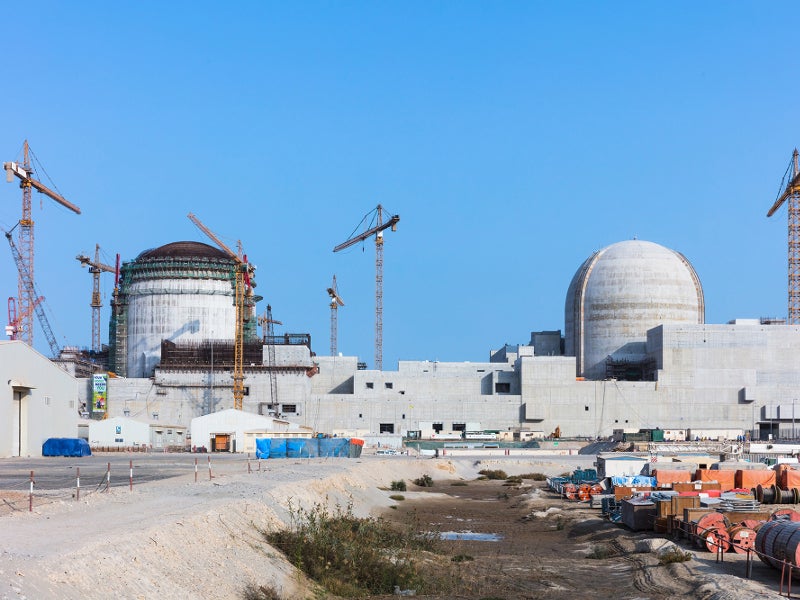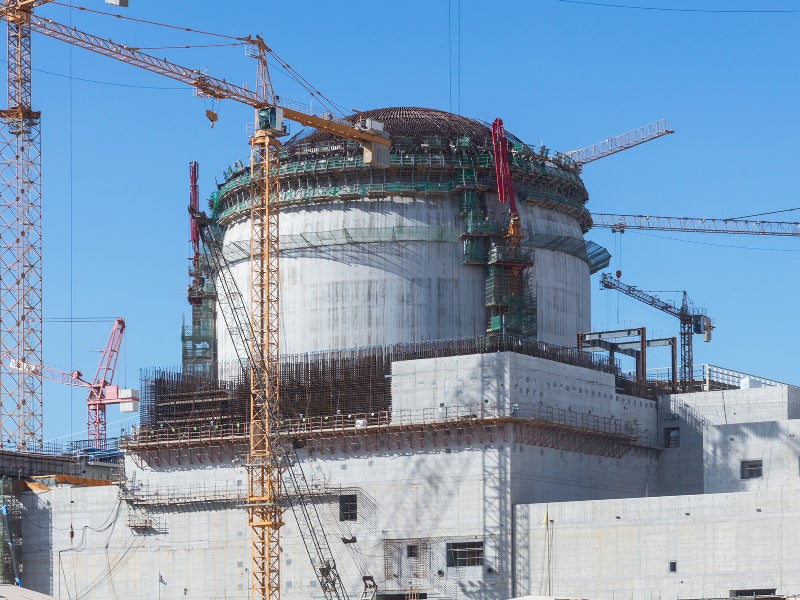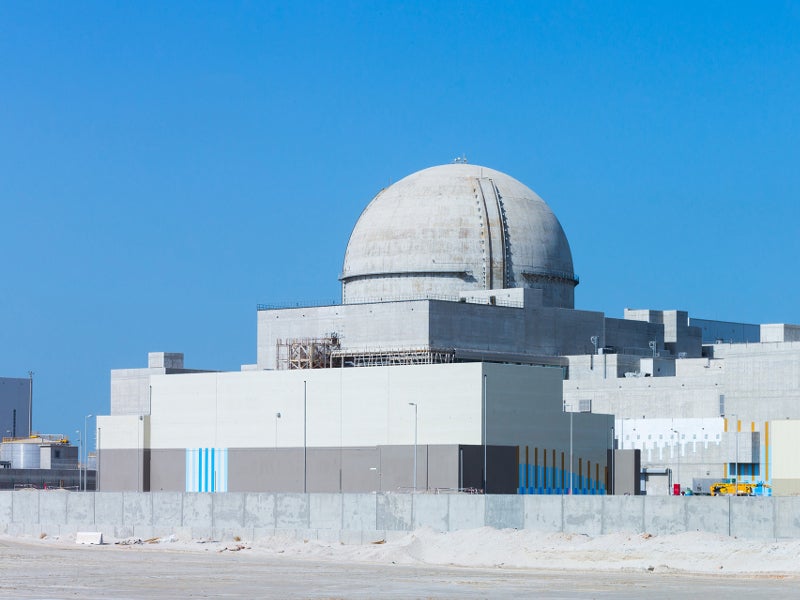The 5.6GW Barakah nuclear power plant (NPP) in Abu Dhabi, United Arab Emirates (UAE), was jointly developed by Emirates Nuclear Energy Corporation (ENEC) and Korea Electric Power Corporation (KEPCO). It is the first nuclear power project to be developed in the country.
Nawah Energy Company, a joint venture between ENEC and KEPCO, is the operator of the plant.
The ground-breaking ceremony for the $32bn project was held in March 2011. The plant is equipped with four units of 1.4GW each and can generate up to 40TWh of power annually.
It supplies up to a quarter of the UAE’s electricity needs, powering residential areas and key industries.
This emission-free energy is sufficient to annually power 16 million electric vehicles, marking a significant stride in the UAE’s and the region’s decarbonisation efforts.
Annually, the Barakah Plant prevents 22.4 million tonnes of carbon emissions, which is akin to taking 4.6 million cars off the roads each year.
This contributes to fulfilling 24% of the UAE’s decarbonisation goals for 2030, as outlined in its Nationally Determined Contributions.
To date, the plant has created employment opportunities for more than 2,000 skilled Emirati professionals.
Location
The Barakah nuclear power plant is located 53km from the city of Ruwais, in Abu Dhabi, UAE.
Development background
The construction of Unit 1 began in July 2012, following the receipt of a construction licence from the Federal Authority of Nuclear Regulation. The construction was completed in May 2018.
The plant completed fuel assembly loading into unit one in March 2020, marking the commissioning of nuclear operations.
The construction of Unit 2 began in May 2013 while that of Unit 3 began in September 2014. The first concrete pouring of Unit 4 took place in September 2015.
The main concrete works and heavy lifting for Units 2, 3 and 4 were completed by November 2018.
Construction of the plant’s Unit 2 was finalised in 2020, with operations commencing in 2021. Unit 3 was completed in 2021 and began operations in September 2022.
Unit 4 was completed in July 2022, underwent operational readiness testing in 2023, and started commercial production in September 2024.
In October 2016, Barakah One Company and the Abu Dhabi Water and Electricity Company, now known as the Emirates Water and Electricity Company, announced a power purchase agreement setting the pricing structure for electricity from Barakah Units 1 to 4.
Nuclear reactors at Barakah power plant
The Barakah nuclear power plant is equipped with four identical Advanced Power Reactor 1400 MW (APR1400) nuclear reactors, which were developed by the Korean nuclear industry under the leadership of KEPCO.
The reactor design is based on System 80+, which is certified by the Nuclear Regulatory Commission in the US.
The reactor is licensed by the Korean nuclear safety regulator, the Korea Institute of Nuclear Safety, and is expected to have a lifespan of 60 years.
Reactor technology
The APR1400 is an advanced pressurised water nuclear reactor designed by KEPCO. It is an upgraded version of OPR1000, the Optimum Power Reactor 1000MW, the first standard pressurised water reactor plant in Korea.
The APR1400, a Generation-III+ reactor, consists of advanced features such as direct vessel injection from the safety injection system, a passive flow regulation device in the safety injection tank, an in-containment refuelling water supply system and systems for severe accident mitigation and management.
The reactor features two steam generators that transfer the heat of 4GW from the reactor coolant system to the secondary system, producing steam to drive the turbine generator that produces a net electrical power of 1.4GW.
The plant’s reactors have been adapted to suit the climatic conditions of the UAE. The reactors have larger pumps, plant cooling and seawater intake systems, improved ventilation and a more refined intake screen design.
The plant is designed to withstand earthquakes of a 7.0 magnitude or higher on the Richter scale.
Fuel supply for UAE’s first nuclear power plant
ENEC signed supply contracts with Areva and Techsnabexport for the supply of uranium concentrates along with providing conversion and enrichment services.
Uranium One and Rio Tinto were contracted for the supply of natural uranium for the plant. ConverDyn provided conversion services while Urenco provided enrichment services.
The enriched uranium was supplied to Kepco Nuclear Fuels for manufacturing the fuel assemblies for use at the Barakah nuclear plant.
Barakah nuclear power plant financing
The project’s financing included a $19.6bn loan, of which $16.2bn was provided by the Abu Dhabi government and a $2.5bn loan was from the Export-Import Bank of Korea.
Also included was a $250m loan provided by the National Bank of Abu Dhabi, First Gulf Bank, HSBC and Standard Chartered.
Additionally, $4.7bn in equity commitments was received for the establishment of the Barakah One Project Joint Venture Company, with equity interests shared between ENEC and KEPCO.
Contractors involved in UAE’s nuclear power plant
ENEC awarded a $20.4bn contract to the consortium led by KEPCO for the design, construction and operation of four APR1400 nuclear power units at the Barakah NPP in December 2009.
The consortium includes Korea Hydro and Nuclear Power (KHNP), Hyundai, Samsung, Doosan, Korea Power Engineering Company, and Korea Plant Service and Engineering (KPS).
KHNP was in charge of the operating support services and cooperative businesses while KEPCO Engineering and Construction (KEPCO E&C) was awarded the subcontract for providing plant design, architecture and engineering works.
Doosan was entrusted with the construction and management of the nuclear steam supply system, steam generator and other related components.
Hyundai and Samsung were responsible for the civil engineering works while Westinghouse provided technical assistance and licence-related works. KNF supplied nuclear fuel, which is maintained by KPS.
Hilal Bil Badi and Partners Contracting, a local company, was contracted to develop critical water intake structures for the project.
The reinforced concrete structures provide cooling water for the turbine condensers and heat exchangers in the turbine generator building.
Bechtel provided design and project management support services to KEPCO E&C, a subsidiary of KEPCO.
Nawah Energy Company signed a long-term operation and maintenance agreement with EDF for the Barakah nuclear power plant in November 2018.
Korea Hydro & Nuclear Power and KEPCO Plant Service & Engineering were awarded a long-term maintenance contract for the Barakah nuclear energy plant in June 2019.
KHNP also operates and maintains South Korea’s Shin Kori nuclear power plant Units 3 and 4.







